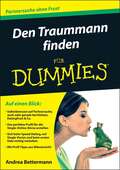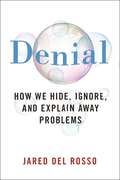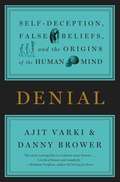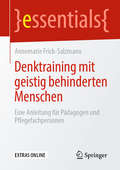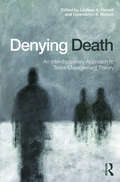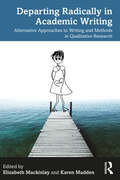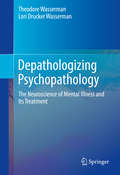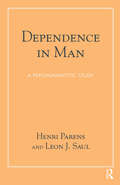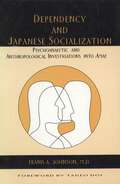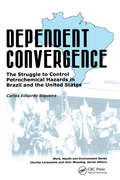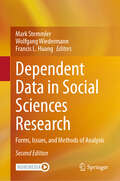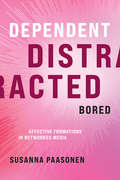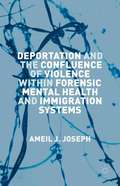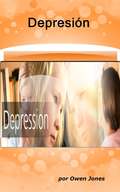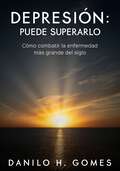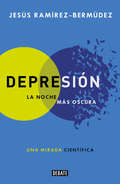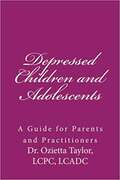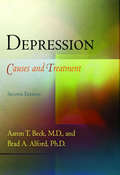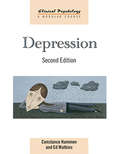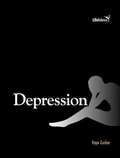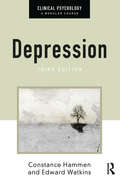- Table View
- List View
Den Traummann finden für Dummies (Für Dummies)
by Andrea BettermannSo finden Sie einen Mann, der zu Ihnen passt Sind Sie auf der Suche nach Ihrem Traummann, aber Wissen nicht so recht, wie Sie ihn finden können? Andrea Bettermann begleitet Sie bei der Partnersuche. Sie gibt Ihnen konkrete Tipps, wie Sie in Onlinebörsen, Speed-Datings oder auf Single-Partys Ihrem Traummann begegnen können. Sie hilft Ihnen, sich darüber klar zu werden, was Sie eigentlich suchen, und zeigt Ihnen, dass es oft sinnvoll ist, auch rechts und links zu schauen. Vor allem aber macht sie Ihnen Mut, auch die Zeit als Single zu genießen, auf sich selbst zu vertrauen und selbstbewusst auf die Suche zu gehen.
Denial: A Memoir
by Jessica SternIn this powerful memoir, a terrorism expert and assault survivor shares a clear-eyed, elucidating study of the profound reverberations of trauma” (Publishers Weekly, starred review).One of the world’s foremost experts on terrorism and post-traumatic stress disorder, Jessica Stern knows what it is to live through horror. In this brave and astonishingly frank examination of her own unsolved rape at the age of fifteen, she investigates how the rape and its aftermath came to shape her future and her work. The author of the New York Times Notable Book Terror in the Name of God, Stern brilliantly explores the nature of evil in an extraordinary volume that Louise Richardson, author of What Terrorists Want, calls, “Memorable, powerful and deeply courageous…a riveting read.”“Denial is one of the most important books I have read in a decade. . . . Brave, life-changing, and gripping as a thriller. . . . A tour de force.” —Naomi Wolf
Denial: How We Hide, Ignore, and Explain Away Problems
by Jared Del RossoFrom climate change to fake news, an entertaining and enlightening look at the widespread phenomenon of denial in our societyDonald Trump won the election; climate change isn’t real; America is a color-blind country. Despite overwhelming evidence to the contrary, why do so many of us refuse to admit the truth? In fact, as Jared Del Rosso argues in this thought-provoking book, denial is so much a part of our lives that we deny its existence all the time, even when this works against our best interest, even when we are being choked by its very fumes. Denial is one of those rare books that will change the way you think. In a highly readable style that draws on examples from current events, politics, and pop culture, Del Rosso teases out the complexities of denial, from “not noticing” that someone has food stuck in their teeth, to companies that engage in widespread fraud, like Enron and Wells Fargo, to the much larger-scale denials of climate change or systemic racism. Drawing on classic studies in the social sciences and his own research of the denial of torture, Del Rosso builds a fascinating typology of the forms and meanings of denial, exploring the behavior of those who refuse to acknowledge their actions, and what it means to live in a society where such lying, fraud, and corruption is commonplace.In wide-ranging examples, Del Rosso explores the causes, strategies, and consequences of denial. When scandal hits and accusations of misconduct are made, he argues that individuals like Harvey Weinstein or Brett Kavanaugh, or organizations like the Catholic Church or Penn State, go through a series of moves to try to avoid accountability. Del Rosso focuses on the individuals involved but also asks: how could so many people not know what their priests, or their coaches, or their coworkers were doing? Del Rosso effectively argues that recognizing what denial looks like is the crucial first step in mitigating its effects on us and society as a whole. At a time when powerful people and institutions are increasingly being held accountable for their actions, Denial provides an undeniable reality check.
Denial: Self-Deception, False Beliefs, and the Origins of the Human Mind
by Ajit Varki Danny BrowerThe history of science abounds with momentous theories that disrupted conventional wisdom and yet were eventually proven true. Ajit Varki and Danny Brower's "Mind over Reality" theory is poised to be one such idea-a concept that runs counter to commonly-held notions about human evolution but that may hold the key to understanding why humans evolved as we did, leaving all other related species far behind. At a chance meeting in 2005, Brower, a geneticist, posed an unusual idea to Varki that he believed could explain the origins of human uniqueness among the world's species: Why is there no humanlike elephant or humanlike dolphin, despite millions of years of evolutionary opportunity? Why is it that humans alone can understand the minds of others? Haunted by their encounter, Varki tried years later to contact Brower only to discover that he had died unexpectedly. Inspired by an incomplete manuscript Brower left behind, DENIAL presents a radical new theory on the origins of our species. It was not, the authors argue, a biological leap that set humanity apart from other species, but a psychological one: namely, the uniquely human ability to deny reality in the face of inarguable evidence-including the willful ignorance of our own inevitable deaths. The awareness of our own mortality could have caused anxieties that resulted in our avoiding the risks of competing to procreate-an evolutionary dead-end. Humans therefore needed to evolve a mechanism for overcoming this hurdle: the denial of reality. As a consequence of this evolutionary quirk we now deny any aspects of reality that are not to our liking-we smoke cigarettes, eat unhealthy foods, and avoid exercise, knowing these habits are a prescription for an early death. And so what has worked to establish our species could be our undoing if we continue to deny the consequences of unrealistic approaches to everything from personal health to financial risk-taking to climate change. On the other hand reality-denial affords us many valuable attributes, such as optimism, confidence, and courage in the face of long odds. Presented in homage to Brower's original thinking, DENIAL offers a powerful warning about the dangers inherent in our remarkable ability to ignore reality-a gift that will either lead to our downfall, or continue to be our greatest asset.
Denktraining mit geistig behinderten Menschen: Eine Anleitung für Pädagogen und Pflegefachpersonen (essentials)
by Annemarie Frick-SalzmannDie Pädagogin und erfahrene Autorin Annemarie Frick-Salzmann stellt in diesem Band ihr eigens konzipiertes Denktraining für geistig behinderte Menschen vor. Geistig behinderte Menschen nach ICD-10 lassen sich auch geistig stimulieren. Vielerorts wird das zu wenig beachtet. In diesem essential werden verschiedene Möglichkeiten geistiger Anregungen in einem Denktraining aufgelistet. Das Konzept der Autorin ist einmalig und fußt vor allem auf induktiven Denkaufgaben (nach K. J. Klauer). Die induktiven Denkaufgaben sind sehr praxisbezogen und haben einen hohen Transfer auf die Bewältigung des Alltags. Die Arbeit ist auf eine Viertelstunde begrenzt und ist ein Dialogtraining. Der große Vorteil für die Bewohner eines Heimes ist, dass damit die persönliche Zuneigung motivierend ist und konzentriert gearbeitet werden kann. Zum Buch werden Arbeitsblätter online bereitgestellt.
Denying Death: An Interdisciplinary Approach to Terror Management Theory
by Lindsey A. Harvell Gwendelyn S. NisbettThis volume is the first to showcase the interdisciplinary nature of Terror Management Theory, providing a detailed overview of how rich and diverse the field has become since the late 1980s, and where it is going in the future. It offers perspectives from psychology, political science, communication, health, sociology, business, marketing and cultural studies, among others, and in the process reveals how our existential ponderings permeate our behavior in almost every area of our lives. It will interest a wide range of upper-level students and researchers who want an overview of past and current TMT research and how it may be applied to their own research interests.
Denying Death: An Interdisciplinary Approach to Terror Management Theory (The\enlightenment World Ser.)
by Lindsey A. Harvell Gwendelyn S. NisbettThis volume is the first to showcase the interdisciplinary nature of Terror Management Theory, providing a detailed overview of how rich and diverse the field has become since the late 1980s, and where it is going in the future. It offers perspectives from psychology, political science, communication, health, sociology, business, marketing and cultural studies, among others, and in the process reveals how our existential ponderings permeate our behavior in almost every area of our lives. It will interest a wide range of upper-level students and researchers who want an overview of past and current TMT research and how it may be applied to their own research interests.
Departing Radically in Academic Writing: Alternative Approaches to Writing and Methods in Qualitative Research
by Elizabeth Mackinlay Karen MaddenDeparting Radically in Academic Writing (DRAW) seeks to show qualitative researchers that there are ways to embrace creatively alternative approaches to writing, whilst fulfilling the demands of an academic tenure system. Putting forward playful, arts-based and creative writing/fiction approaches to writing up research, the contributions in this book demonstrate how theorisation can happen in different ways, particularly, for younger career scholars struggling with their thesis submissions. Some of the contributions in the book come from those who have successfully defended a "DRAWn" thesis. Whilst this is not a handbook or "how to", it does show DRAW and radical departure work can work in practice without disadvantaging the researcher. Each chapter includes Author's Notes on the chapter and Radical Writing Prompts to stimulate creative thinking. Drawing on the work of Sara Ahmed, Ruth Behar, bell hooks, Helene Cixous, Virginia Woolf, Laurel Richardson and other literary and creative feminist, qualitative thinkers, Departing Radically in Academic Writing will appeal to graduate students and researchers in Education, the social sciences and humanities who are interested to advance critical thinking through radically departured work.
Depathologizing Psychopathology
by Theodore Wasserman Lori Drucker Drucker WassermanThis brief, accessible treatise harnesses the neurophysiological processes of learning to create an innovative and powerful approach to therapy. It sets out a non-pathologizing alternative not only to the current medicalized conception of diagnosis and treatment but also to the labeling of relatively normal reactions to stressors and upsets as illnesses. Rooted in the neurobiology of human learning, the book's approach to treatment, Neuro-Cognitive Learning Therapy, characterizes maladaptive behavior patterns as learned responses to upsetting conditions--processes which can be unlearned. In addition, the coverage includes a clinical teaching guide for bringing NCLT theoryand methods into the training curriculum. This groundbreaking volume: Proposes a non-stigmatizinglearning model for therapy, Neuro-Cognitive Learning Therapy. Introduces the concept of the connectome and explains its criticalrole in mental health and illness. Differentiates between theunconscious and automaticity in cognition and behavior. Addresses theapplicability of NCLT to biologically-based mental disorders. Offers case studies illustrating NCLT in contrast with commonly-used approaches. Includes a chapter-by-chapter clinical teaching guide with therapeutic principles and discussion questions. Provides a comprehensivetherapeutic framework for practitioners of all orientations. Depathologizing Psychopathology gives neuropsychologists, psychiatrists, clinical social workers, and child and school psychologists new ways of thinking about mental illness and learning about learning for a bold new step in the evolution of mind/brain knowledge.
Dependence in Man: A Psychoanalytic Study
by Leon Joseph Saul Henri ParensThis book provides an outline of the phenomenon of dependence as a reality in psychological functioning. It presents clinical examples to show how defense mechanisms are mobilized in response to what the individual conceives of as a threat to his autonomy and separateness.
Dependency and Japanese Socialization: Psychoanalytic and Anthropological Investigations in Amae
by Frank A. Johnson"Surprisingly readable and studded with nuggets of insight."-The Daily Yomiuri "This insightful, well-written, fascinating book offers new understandings, not only of Japan, but also of American culture. It is essential for those in anthropology, psychology, sociology, and psychiatry who are interested in culture, as well as those in law and the business community who deal with Japan."-Paul Ekman, Ph.D.,Director, Human Interaction Laboratory, Langley Porter Institute, University of California, San Francisco "[A] thoughtful cross-cultural study of development...His work can only enhance the still evolving psychoanalytic theory of preoedipal development as it is being derived mostly from psychoanalytic research on child-parent interaction in American families."-Calvin F. Settlage, M.D. "Johnson's ambitious and exhaustive synthesis of anthropological and psychological treatments of dependency raises interesting questions. . . Johnson alerts the reader to issues of universalism and relativity and leads us to ask, 'What would psychoanalysis be like, if it had originated in Japan?'"-Merry I. White, Edwin O. Reischauer Institute of Japanese Studies, Harvard University ". . . Johnson's erudite and critical re-examination of human dependence succeeds to re-profile dependence meaningfully and revives our interest in this major aspect of human experience. Indeed, much food for thought for both psychoanalysts and anthropologists."-Henri Parens, M.D., Philadelphia Psychoanalytic Institute Western ideologies traditionally emphasize the concepts of individualism, privacy, freedom, and independence, while the prevailing ethos relegates dependency to a disparaged status. In Japanese society, the divergence from these western ideals can be found in the concept of amae (perhaps best translated as indulgent dependency) which is part of the Japanese social fiber and pervades their experience. For the Western reader, the concept of amae is somewhat alien and unfamiliar, but in order to understand the Japanese fully, it is essential to acquire a familiarity with the intensity that accompanies interdependent affiliations within their culture. To place amae in the proper context, Johnson critically examines the western attitudes toward dependency from the perspectives of psychoanalysis, psychiatry, developmental psychology, and anthropology. Johnson traces the development of the concept and uses of the term dependency in academic and developmental psychology in the West, including its recent eclipse by more operationally useful terms attachment and interdependency. This timely books makes use of the work of Japanese psychiatrist Takeo Doi, whose book The Anatomy of Dependence introduced the concept of amae to the West. Johnson goes on to illuminate the collective manner in which Japanese think and behave which is central to their socialization and educational practices, especially as seen in the stunning success of Japanese trading practices during the past twenty years. A major emphasis is placed upon the positive aspects of amae, which are compared and contrasted with attitudes toward dependency seen among other nationalities, cultures, and groups in both Western and Asian societies. Complete with a glossary of Japanese terms, Dependency and Japanese Socialization provides a comprehensive investigation into Japanese behavior.
Dependent Convergence: The Struggle to Control Petrochemical Hazards in Brazil and the United States (Work, Health and Environment Series)
by Carlos E. SiqueiraComparative analyses of social actors and policy outcomes in Bahia and Texas show the similarities and differences in the actors and the policies adopted in each case. As a result of historical and structural developments in Bahia and Texas, Cetrel operates under pollution-control standards and technologies for protecting the environment and workers that are similar to those of the GCA. This convergent trend is characterized as dependent convergence between developing and developed countries. The author makes recommendations for stronger international solidarity among progressive forces in developed and developing countries to promote preventive alternatives to pollution control.
Dependent Data in Social Sciences Research: Forms, Issues, and Methods of Analysis
by Wolfgang Wiedermann Mark Stemmler Francis L. HuangThis book covers the following subjects: growth curve modeling, directional dependence, dyadic data modeling, item response modeling (IRT), and other methods for the analysis of dependent data (e.g., approaches for modeling cross-section dependence, multidimensional scaling techniques, and mixed models). It presents contributions on handling data in which the postulate of independence in the data matrix is violated. When this postulate is violated and when the methods assuming independence are still applied, the estimated parameters are likely to be biased, and statistical decisions are very likely to be incorrect. Problems associated with dependence in data have been known for a long time, and led to the development of tailored methods for the analysis of dependent data in various areas of statistical analysis. These include, for example, methods for the analysis of longitudinal data, corrections for dependency, and corrections for degrees of freedom. Researchers and graduate students in the social and behavioral sciences, education, econometrics, and medicine will find this up-to-date overview of modern statistical approaches for dealing with problems related to dependent data particularly useful.
Dependent, Distracted, Bored: Affective Formations in Networked Media
by Susanna PaasonenA new approach to understanding the culture of ubiquitous connectivity, arguing that our dependence on networked infrastructure does not equal addiction.In this book, Susanna Paasonen takes on a dominant narrative repeated in journalistic and academic accounts for more than a decade: that we are addicted to devices, apps, and sites designed to distract us, that drive us to boredom, with detrimental effect on our capacities to focus, relate, remember, and be. Paasonen argues instead that network connectivity is a matter of infrastructure and necessary for the operations of the everyday. Dependencies on it do not equal addiction but speak to the networks within which our agency can take shape.
Depersonalization: A New Look at a Neglected Syndrome
by Mauricio SierraDepersonalization is a dissociative disorder, causing alteration in the perception or experience of the self and a sense of detachment from reality. This is a fascinating and clinically relevant phenomenon neglected within psychiatry. Far from being a rare condition, recent research has shown chronic, persisting depersonalization to be as prevalent as schizophrenia or bipolar mood disorder.
Deportation and the Confluence of Violence within Forensic Mental Health and Immigration Systems
by Ameil JosephThe practices and technologies of evaluation and decision making used by professionals, police, lawyers and experts are questioned in this book for their participation in the perpetuation of historical forms of colonial violence through the enforcement of racial and eugenic policies and laws in Canada.
Depresión (Como hacer... #77)
by Owen JonesDepresión Descripción del libro: Hola y gracias por comprar este libro electrónico llamado "Depresión". Espero que encuentre la información útil, útil y rentable. Tenga en cuenta que escribí el contenido de este libro electrónico después de una gran cantidad de investigación. No puedes comprar este libro electrónico en ningún otro lado, sino de mí. Si encuentra que esto no es cierto, deme la URL del sitio ofensivo, para que pueda cerrarlo por robo. La información en este libro electrónico sobre varios aspectos de la depresión y temas relacionados está organizada en 15 capítulos de aproximadamente 500-600 palabras cada uno. Espero que interese a quienes están preocupados por sus problemas con la depresión en todas sus formas. Como beneficio adicional, le doy permiso para usar el contenido en su propio sitio web o en sus propios blogs y boletines informativos, aunque es mejor si los reescribe en sus propias palabras primero. También puede dividir el libro y revender los artículos. De hecho, el único derecho que no tiene es revender o regalar el libro tal como se le entregó. Si tiene algún comentario, déjelo en la compañía a la que le compró este libro. También puedes encontrar más libros como este allí. Gracias de nuevo por comprar este libro electrónico, Saludos Owen Jones
Depresión: Cómo combatir la enfermedad más grande del siglo.
by Danilo H. GomesDesafortunadamente, la depresión está clasificada como una de las enfermedades más graves en la actualidad. Muy pocos logran combatirlo, mientras que la mayoría de ellos sucumben al suicidio o permanecen atrapados en este caos emocional toda su vida. Depresión: "Tú puedes superarlo", ofrece al lector varias instrucciones fácilmente practicables que han resultado en la superación de la propia depresión del escritor. Dividido en 13 capítulos y con un lenguaje de fácil comprensión, el libro aborda temas de los más diversos tipos utilizando también ejemplos reales.
Depresión: La enfermedad del siglo
by Alain Gerard Ana PinedaLas enfermedades humanas que pertenecen al campo de la psiquiatría, particularmente la depresión, son difíciles de delimitar, de tratar y de prevenir. Igualmente, se abre un abismo entre lo que las investigaciones descubren y lo que se transmite al cuerpo médico y al gran público.
Depresión: La noche más oscura
by Jesús Ramírez-BermúdezEs una profunda tristeza, mezclada con miedo y dolor emocional, que roba la energía, el sueño y la concentración; parece que la felicidad está prohibida y que no hay rutas para seguir... Se llama «depresión mayor», y es la noche más oscura. La ciencia conoce muchísimo sobre la depresión. Sabe, por ejemplo, que la genética y las enfermedades pueden desencadenarla, pero también la violencia y la desprotección social. El estrés, las pérdidas, las separaciones familiares, la pobreza, el abuso sexual y el maltrato infantil pueden afectar la salud mental y la armonía de nuestro cuerpo. Pero la ciencia sabe también que hay vías para salir adelante. Desde la psicoterapia y el deporte hasta los medicamentos, hay opciones cuya efectividad es analizada con rigor en esta obra. La psiquiatría clínica, las neurociencias, la psicología y la investigación social tienen mucho que decir. Esta obra relata la larga historiade la depresión, desmonta los mitos que la rodean, presenta datos verificados a partir de los estudios más recientes y explora, ante todo, los caminos para atravesar la noche más oscura.
Depressed Children And Adolescents: A Guide For Parents And Practitioners
by Ozietta TaylorThis book has been written to alert parents and practitioners about the symptoms of depression in children and adolescents. It denotes the treatment options that are available in helping these children cope effectively with the disorder.
Depression
by Aaron T. Beck Brad A. AlfordMore than forty years ago, Dr. Aaron T. Beck's pioneering Depression: Causes and Treatment presented the first comprehensive account of all aspects of depression and introduced cognitive therapy to health care providers and patients struggling with one of the most common and devastating diseases of the modern age. Since that classic text first appeared, the appreciation of the multifaceted nature of mood disorders has grown, and the phenomenological and biological aspects of psychology are increasingly seen as intertwined. Taking these developments into account, Beck and his colleague Brad A. Alford have written a second edition of Depression that will help patients and caregivers understand depression as a cognitive disorder.The new edition of Depression builds on the original research and approach of the seminal first edition, including the tests of Freud's theory that led to a new system of psychological theory and therapy, one that addresses the negative schema and automatic thoughts that can trap people in painful emotional states. Beck and Alford examine selected scientific tests and randomized controlled trials that have enhanced the cognitive approach since the time it was first introduced.Incorporating accepted changes in the definitions and categories of the various mood disorders into its discussion, Depression addresses the treatment role of revolutionary drugs, such as the selective serotonin reuptake inhibitors (SSRIs), electroconvulsive therapy (ECT), and transcranial magnetic stimulation (TMS) in relation to cognitive approaches. Beck and Alford explore research on neurotrophic and neurogenesis theories of depression. They also report on advances in psychosocial treatment of depression, including the value of cognitive therapy in the prevention of relapse.
Depression
by Constance Hammen Ed WatkinsThis book is intended for students and professionals who are seeking an up-to-date summary of research-based information on depression. Chapters cover clinical and diagnostic information, as well as features of the course of depression and the demographic features of the disorder. For example, topics include the considerable impairment associated with depression (it isn't 'all in your mind') and discussion of why depression is particularly common in women and the young. A series of chapters discusses the presumed causes of depression, including genetic and biological factors, as well as cognitive, family, stress and interpersonal contributors to depression. Finally, two chapters discuss current developments in the treatment of depressive disorders, including pharmacological and other medical interventions, as well as effective psychotherapies. The book presents research at a level that is understandable by those who are not experts in the field. Also, an attempt is made to present balanced perspectives, acknowledging the contributions of various models of cause and treatment. Clinical examples and practical implications are highlighted to make the book readable and relevant.
Depression
by Faye ZuckerEveryone feels blue sometimes, but how do you know if you're depressed? Depression is a medical condition that occurs when the ordinary blues just won't go away. These feelings of sadness and hopelessness affect more than eighteen million Americans. Depression can help you learn more about the many forms of this illness, as well as its signs and symptoms. You'll also find out about methods of treatment that can help you manage the dark moods of depression, turning sadness into joy.
Depression (Clinical Psychology: A Modular Course)
by Constance Hammen Ed WatkinsDepression provides a valuable and accessible resource for students, practitioners, and researchers seeking an up-to-date overview and summary of research-based information about depression. With the help of clinical examples, the authors present chapters covering the hypothesized causes of depression, including genetic and biological factors, life stress, family, and interpersonal contributors to depression. The third edition extensively updates prior coverage to reflect advances in the field. The presumed causes of depression from both a biological perspective as well as from social and cognitive perspectives are explored in detail. Two chapters explore the most recent developments in pharmacological and biological interventions and in psychological treatments, as well as the prevention of depression. This new edition includes updated discussion about challenges in research, including heterogeneity and diagnosis of depression and proposed solutions, as well as the efficacy and availability of treatments. Authored by experts in the field who are active researchers and clinicians, Depression provides a state-of-the-art primer for final year undergraduate and postgraduate students, clinicians, professionals, and researchers seeking a broad reference task that critically evaluates research into depression.
